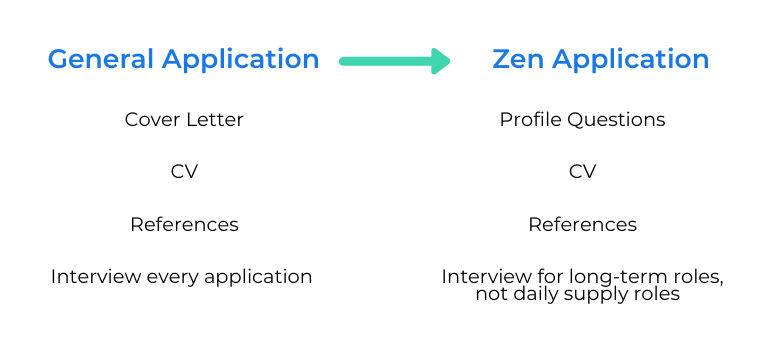Vivienne Chan
11 Mar 2021
10
min read

Why should you refine your professional profile? We hosted a workshop to explore why it matters, how to develop your CV and suggest effective frameworks to take forward.
With a growing number of schools advertising short-term and long-term supply roles in London, Birmingham and Manchester, we hosted a workshop to outline practical ways to strengthen your online profile. Our hosts were:
Mick Channon, Zen Educate’s Operations Lead and Former History Teacher
Jason Kennedy, Head of Geography at Hallfield Primary School
Mick and Jason gave valuable insights into the components of a strong professional profile and how to effectively evidence the impact of your teaching to school leaders.
A refined profile will help you secure roles
“Take the mindset of a school leader looking to hire someone. Ask yourself ‘would I hire someone who’s profile looks like this?’” - Mick Channon
Summary: After working closely with school leaders, Mick’s key message was “the more refined your profile is, the higher the chance of effectively showcasing your skills” and finding a role. A strong profile will communicate your commitment to educating children, evidence your diligence and highlight your aspirations to progress in your career. Furthermore, ensuring the timeline on your CV matches your references demonstrates consistency and transparency.
Key Zen Insights: Regardless of your employer, the components of a good professional profile will be the same.

The components of a job application
At least two professional references must cover two years prior - professional references evidence a “theme in your chosen work and the ability to consistently perform”. Mick highlighted how references from school leaders – a Head of Year, Deputy Headteacher or Headteacher – elevate your profile. If you’re early in your career, academic references or non-school references are acceptable, but character references are not suitable. Exclude references from peers, colleagues or members of communities you’re part of.
Key Supply Insights: Jason suggested:
Include a smart photo. Schools have also said his “video is why we wanted to have you”
Summarise your main experience, list of year groups taught, preferences, key strengths
Evidence of your SEND experience
Examples of how you’ve been an asset to schools
Opportunities: Mick said “taking the time to develop your profile is an exercise in professional development”, and regularly updating your profile is an investment in your career. Zen’s profile questions pre-empt what Headteachers may ask you, so “succinctly summarising in writing is good practice before an interview” for a long-term role.
Engaging with your Zen profile regularly and updating your calendar will feature you higher in searches that schools make on our platform. If you’re active and responsive, you’ll be more frequently requested. Jason found that Zen was easier to sign up with compared to other apps, with the option to “put yourself as unavailable or available” and control the bookings you accept.
Develop your CV to a high-quality and honest standard
“Aim for simplicity. Simple works when it comes to a CV. ‘Less is more’ is a good takeaway here” - Mick Channon
Summary: The content of a CV should be developed through the lens of your audience, Mick summarised how a CV is “Not for you but for the Headteacher that's looking to recruit you”. That said, it’s important to be honest about your experience. It’s perfectly acceptable to have gaps in your CV because you were looking for work, travelling or studying, as long as it’s explained.
Key Zen Insights: A strategic and selective approach must be adapted to get the tone right. Budget a generous amount of time to work on it, perhaps “an empty afternoon, two or three evenings” to produce a concise summary of your achievements. For long-term roles, it is beneficial to highlight your unique interests (music, sports, cooking) because school leaders might be searching for candidates who meet specific criteria.
Key Supply Insights: To effectively develop your CV, Jason proposed the ‘Three C’s Framework’. A crucial message was “not to record everything, but reflect on your different experiences and record the best examples of your achievements in succinct fashion”. While Jason acknowledged that this sometimes isn’t easy, he explained that the payoff can be substantial.
The Three C's Approach to Developing your CV
Clear Structure and Layout
Work experience first (most recent at top)
Education second
Comprehensive
No gaps, chronological order
Responsibilities of your role, not only the job description
Proud career moments, results and impact of your work
Personal achievements/interests - your unique value to schools
Concise
Maximum of 2 pages
Opportunities: Mick reminded us to invite feedback on our CV and competency examples - “It's really good to get feedback from trusted colleagues, and friends. They will help you refine your profile the more honest they are with you”.
Evidence the impact of your teaching
“What schools are inevitably looking for (...) is that their pupils are going to benefit from you being there” - Jason Kennedy
Summary: Include key information in your introduction - the number of years (i.e. 4 years in Primary), your SEND experience (i.e. 1:1, autism), subject knowledge (i.e. Phonetics, Geography) and location preferences. Unlike traditional job applications, you’ll only have to submit this information once.
Key Zen Insights: “Schools hire people, not robots”. Mick reminded candidates to demonstrate a willingness to learn and reflect on past mistakes. Perfection isn’t necessary, just show you're able to grow and progress in your career.
Key Supply Insights: Jason explained the power of non-education based qualifications if you don’t have school experience: “imagine the teaching role and its key responsibilities and look where in your life you've demonstrated the same competency”.
The ISE Framework for demonstrating the impact of your teaching
Issue
The school environment, context and challenges they face
Example: Year 1 Class in special measures, children making little progress in English with an ill teacher and many supply teachers
Solution
How you brought about change and evidence children's learning
Example: Adapted knowledge - I applied my experience from teaching children with SEND to the low attainment class. I devised a programme of songs/poems for a Christmas show to encourage the development of language
Evidence
Example: The students use of rhyming and English skills improved, the Christmas show received praise from SLT and relieved parents
Opportunities: “Schools are keen to hire people who are ambitious, who strive to improve grades and lead curriculum development wherever they go” - a powerful statement from Mick on deciding which examples to include. Jason highlighted Zen’s in-app feature to publish positive feedback from schools and add badges such as ‘behaviour management skills’ or ‘communication skills’ to validate your profile.
Heading into schools after improving your profile
To conclude the workshop, Jason summarised how Zen Educate’s app makes finding roles easier with a “quicker and efficient way of doing everything automated”. If your calendar is up to date, you’ll receive notifications when schools request you on your available dates and information will be given on their dress code, arrival time, parking facilities and behaviour policy - although you should check again once in school.
For more guidance, watch the full recording below:
Login to create or update your profile on Zen Educate, an online alternative to traditional teacher and teaching assistant agencies. You might be interested in reading our Teacher Checklist for your first day of primary supply, guide to Makaton training or following us on Instagram for bite-sized teaching tips.



